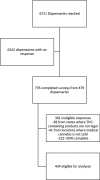Cannabis dispensary staff approaches to counseling on potential contraindications to cannabis use: insights from a national self-report survey
- PMID: 37442944
- PMCID: PMC10347704
- DOI: 10.1186/s12875-023-02095-5
Cannabis dispensary staff approaches to counseling on potential contraindications to cannabis use: insights from a national self-report survey
Abstract
Background: Legal cannabis is available in more than half of the United States. Health care professionals (HCPs) rarely give recommendations on dosing or safety of cannabis due to limits imposed by policy and lack of knowledge. Customer-facing cannabis dispensary staff, including clinicians (pharmacists, nurses, physician's assistants), communicate these recommendations in the absence of HCP recommendations. Little is known about how dispensary staff approach individuals with complex medical and psychiatric comorbidities. Using responses from a national survey, we describe how cannabis dispensary staff counsel customers with medical and psychiatric comorbidities on cannabis use and examine whether state-specific cannabis policy is associated with advice given to customers.
Methods: National, cross-sectional online survey study from February 13, 2020 to October 2, 2020 of dispensary staff at dispensaries that sell delta-9-tetrahydrocannabinol containing products. Measures include responses to survey questions about how they approach customers with medical and psychiatric comorbidities; state medicalization score (scale 0-100; higher score indicates more similarity to regulation of traditional pharmacies); legalized adult-use cannabis (yes/no). We conducted multiple mixed effects multivariable logistic regression analyses to understand relationships between state medicalization and dispensary employees' perspectives.
Results: Of 434 eligible respondents, most were budtenders (40%) or managers (32%), and a minority were clinicians (18%). State medicalization score was not associated with responses to most survey questions. It was associated with increased odds of encouraging customers with medical comorbidities to inform their traditional HCP of cannabis use (Odds ratio [OR]=1.2, 95% confidence interval [CI] 1.0-1.4, p=0.03) and reduced odds of recommending cannabis for individuals with cannabis use disorder (CUD) (OR=0.8, 95% CI 0.7-1.0, p=0.04). Working in a state with legalized adult-use cannabis was associated with recommending traditional health care instead of cannabis in those with serious mental illness (OR 2.2, 95% CI 1.1-4.7, p=0.04). Less than half of respondents believed they had encountered CUD (49%), and over a quarter did not believe cannabis is addictive (26%).
Conclusions: When managing cannabis dosing and safety in customers with medical and psychiatric comorbidity, dispensary staff preferred involving individuals' traditional HCPs. Dispensary staff were skeptical of cannabis being addictive. While state regulations of dispensaries may impact the products individuals have access to, they were not associated with recommendations that dispensary staff gave to customers. Alternative explanations for dispensary recommendations may include regional or store-level variation not captured in this analysis.
Keywords: Cannabis; Health policy; Medical cannabis; Medication safety.
© 2023. The Author(s).
Conflict of interest statement
Dr. Merlin reported grants from Cambia Health Foundation outside the submitted work. Drs. Slawek, Merlin, Arnsten, Starrels, Bulls reported a grant from the National Institutes of Health (NIH) outside the submitted work. Dr. Starrels reported grants from Opioid Post-marketing Requirement Consortium Subcontract for an observational study of the risks of prescription opioids outside the submitted work. Drs. Althouse, Feldman, Liebshutz, Nugent, Orris, Rohac, Morasco, and Kansagara resport no other disclosures.
Figures


References
-
- Hartman M. Cannabis Overview. https://www.ncsl.org/research/civil-and-criminal-justice/marijuana-overv.... Published 2021. Updated 4/8/2021. Accessed 4/26/2021, 2021.
-
- Procon.org. Legal Recreational States and DC. https://marijuana.procon.org/legal-recreational-marijuana-states-and-dc/. Published 2021. Accessed 4/26/2021, 2021.
-
- Procon.org. Legal Medical Marijuana States and DC. https://medicalmarijuana.procon.org/legal-medical-marijuana-states-and-dc/. Published 2021. Accessed 4/26/2021, 2021.
Publication types
MeSH terms
Substances
Grants and funding
LinkOut - more resources
Full Text Sources
Medical
Miscellaneous
